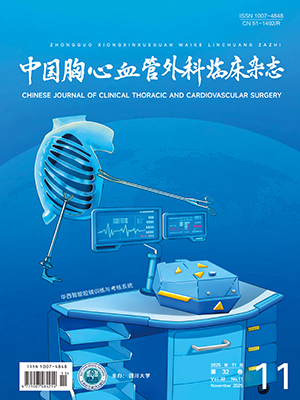| 1. |
Kirklin JK, Westaby S, Blackstone EH, et al. Complement and the damaging effects of cardiopulmonary bypass. J Thorac Cardiovasc Surg, 1983, 86(6): 845-857.
|
| 2. |
Kunes P, Lonsky V, Mand’ak J, et al. The inflammatory response in cardiac surgery. An up-to-date overview with the emphasis on the role of heat shock proteins(HSPs)60 and 70. Acta Medica (Hradec Kralove), 2007, 50(1): 93-99.
|
| 3. |
Boeken U, Feindt P, Zimmermann N, et al. Increased preoperative C-reactive protein (CRP)-values without signs of an infection and complicated course after cardiopulmonary bypass(CPB)-operations. Eur J Cardiothorac Surg, 1998, 13(5): 541-545.
|
| 4. |
American Colledge of Chest Physicians/society of Critical Care Medicine Consensus Conference: Definition for sepsis and organ failure and guideline for the use of innovative therapies in sepsis. Crit Care Med, 1992, 20: 864-874.
|
| 5. |
Khadaroo RG, Marshall JC. ARDS and the multiple organ dysfunction syndrome. Common mechanisms of a common systemic process. Crit Care Clin, 2002, 18(1): 127-141.
|
| 6. |
Vincent JL, Sakr Y, Sprung CL, et al. Sepsis in European intensive care units: Results of the SOAP study. Crit Care Med, 2006, 34(2): 344-353.
|
| 7. |
Nfor TK, Walsh TS, Prescott RJ. The impact of organ failures and their relationship with outcome in intensive care: Analysis of a prospective multicentre database of adult admissions. Anaesthesia, 2006, 61(8): 731-738.
|
| 8. |
Umegaki T, Ikai H, Imanaka Y. The impact of acute organ dysfunction on patients’ mortality with severe sepsis. J Anaesthesiol Clin Pharmacol, 2011, 27(2): 180-184.
|
| 9. |
Tissier R, Chenoune M, Ghaleh B, et al. The small chill: Mild hypothermia for cardioprotection? Cardiovasc Res, 2010, 88(3): 406-414.
|
| 10. |
Birdi I, Caputo M, Underwood M, et al. Influence of normothermic systemic perfusion temperature on cold myocardial protection during coronary artery bypass surgery. Cardiovasc Surg, 1999, 7(3): 369-374.
|
| 11. |
Lewis ME, Alkhalidi AH, Townend JN, et al. The effects of hypothermia on human left ventricular contractile function during cardiac surgery. J Am Cell Cardiol, 2002, 39(1): 102-108.
|
| 12. |
Gilbert NF, Meyer PE, Tauriainen MP, et al. Effects of hypothermia on myocardial substrate selection. Ann Thorac Surg, 2002, 74(4): 1208-1212.
|
| 13. |
Buckberg RD, Brazier JR, Nelson RI. Studies of the effects of hypothermia on reginal myocardial blood flow and metabolism during cardiopulmonary bypass-I. The adequately perfused beating, fibrillating, and arrested heart. J Thorac Cardiovasc Surg, 1977, 73(1): 89-94.
|
| 14. |
Ning XH, Xu CS, Portman MA. Mitochondrial protein and HSP70 signaling after ischemia in hypothermic-adapted hearts augmented with glucose. Am J Physiol, 1999, 277(1 Pt 2): R11-R17.
|
| 15. |
Kim CY, Bae MH, Kim NF, et al. Case of recurrent ventricular fibrillations with Osborn wave developed during therapeutic hypothermia. Korean Circ J, 2015, 45(1): 81-84.
|
| 16. |
Bernard SA, Gray TW, Buist MD, et al. Treatment of comatose survivors of out-of-hospital cardiac arrest with induced hypothermia. N Engl J Med, 2002, 346(8): 557-563.
|
| 17. |
Sablotzki A, Friedrich I, Muhling J, et al. The systemic inflammatory response syndrome following cardiac surgery: different expression of proinflammatory cytokines and procalcitonin in patients with and without multi organ dysfunction. Perfusion, 2002, 17: 103-109.
|
| 18. |
Habib RH, Zacharias A, Schwann TA, et al. Adverse effects of low hematocrit during cardiopulmonary bypass in the adult Should current practice be changed? J Thorac Cardiacvasc Surg, 2003, 125(6): 1438-1450.
|
| 19. |
Herring MJ, Hale SL, Daiw, et al. Hypothermia in the setting of experimental acute myocardial infarction: a comprehensive review. Ther Hypothermia Temp Manag, 2014, 4(4): 159-167.
|
| 20. |
Ristagno G, Tantillo S, Sun S, et al. Hypothermia improves ventricular myocyte contractility under conditions of normal perfusion and after an interval of ischemia. Resuscitation, 2010, 81(7): 898-903.
|
| 21. |
Suga H, Goto Y, Igarashi Y, et al. Cardiac cooling increases Emax without affecting relation between O2 consumption and systolic pressure-volume area in dog left ventricle. Circ Res, 1998, 63(1): 61-71.
|




